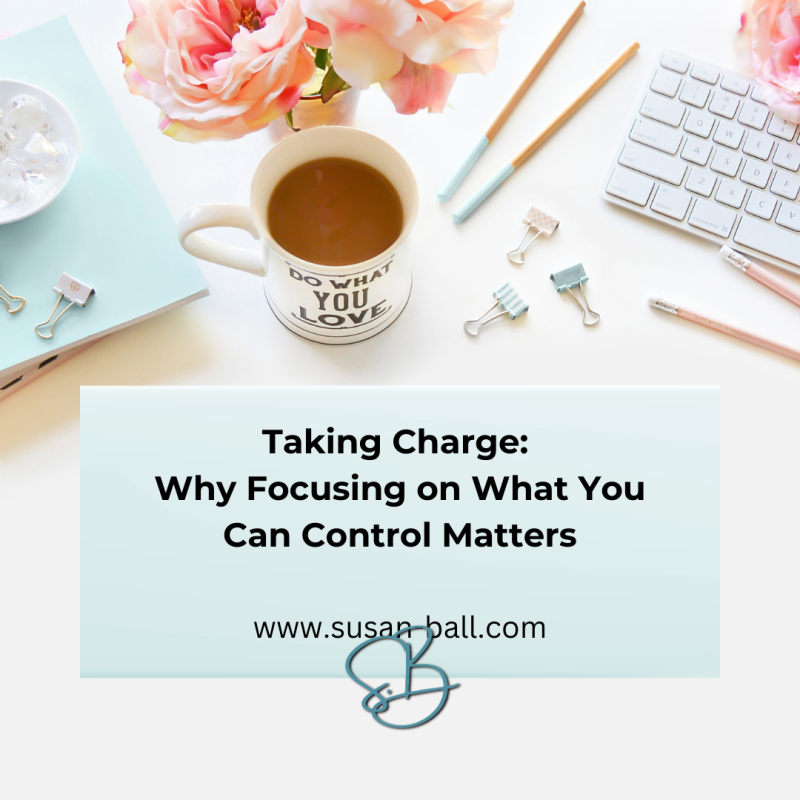Something that is taken away from us in an abusive, toxic, or high-conflict relationship is Control. Throughout the relationship, control belonged to the abuser and you had none. Oh, you tried to control the situation but the abuser's personality disorder and need to abuse was not something you could control.
For women recovering from abusive relationships, taking control can feel overwhelming, scary, and unsafe. However, the power to reclaim your life lies in focusing on what you can control. Now that you're free from abuse, it's time to take control of your life, goals, happiness, and safety.

Understanding Control
Now that you're free, your life and the decisions you make and fully in your Control! And it's time to celebrate. But in the context of recovery and personal growth, it’s crucial to distinguish between what you can and cannot control. This distinction is the cornerstone of developing a healthier mindset and fostering personal empowerment.
What You Can Control:
- Your Actions: You have the power to choose how you respond to situations. This includes setting boundaries, making decisions that align with your values, and taking steps towards your goals.
- Your Attitude: While you can’t control external events, you can control how you perceive and react to them. Cultivating a positive and resilient attitude can transform challenges into opportunities for growth.
- Your Effort: Commitment to your personal development, setting and pursuing goals, and putting in the effort required to achieve them are all within your control.
What You Cannot Control:
- Other People’s Actions: Recognizing that you cannot change others’ behaviour is crucial. Instead, focus on how you interact with them and protect your own well-being.
- Past Events: While the past cannot be changed, you can control how you let it influence your present and future. Embrace the lessons learned and use them to build a stronger, more resilient you.
- External Circumstances: Life is full of uncertainties and unexpected events. While you can’t control these, you can prepare for them and adapt as needed.
The Power of Focusing on What You Can Control
-
Reduces Anxiety and Stress: Worrying about things beyond your control can lead to heightened anxiety and stress. By focusing on what you can control, you can reduce these negative emotions and feel more grounded.
-
Boosts Self-Efficacy: Taking charge of your actions and attitude enhances your belief in your own abilities. This self-efficacy is essential for setting and achieving goals, particularly in the context of recovery and personal growth.
-
Promotes Empowerment: When you focus on what you can control, you reclaim your power. This sense of empowerment is vital for rebuilding your life and creating a future that aligns with your values and aspirations.
-
Encourages Positive Change: By directing your energy towards what you can influence, you set in motion a ripple effect of positive changes. These small, controlled changes can lead to significant improvements in your overall well-being and life satisfaction.
Practical Steps to Focus on What You Can Control
-
Set Realistic Goals: Break down your larger objectives into smaller, manageable tasks. This not only makes them more achievable but also allows you to celebrate small successes along the way.
-
Practice Mindfulness: Mindfulness techniques, such as meditation and deep breathing, can help you stay present and focused on what you can control. These practices can reduce stress and enhance your overall well-being.
-
Establish Boundaries: Setting clear boundaries in your relationships and interactions is crucial. This helps protect your emotional and physical well-being, allowing you to focus on your own growth.
-
Develop a Support Network: Surround yourself with supportive and understanding individuals. They can provide encouragement, perspective, and practical advice as you navigate your journey.
-
Reflect and Adapt: Regularly reflect on your progress and be willing to adapt your approach as needed. Flexibility is key to maintaining control over your personal growth and development.
Journal Prompts to Take Back Control
Effort and Persistence:
- Describe a goal you are working towards. What specific actions and efforts can you control to get closer to achieving it?
Creating a Control Plan:
- Develop a plan for a current challenge by listing what you can control in the situation. How will focusing on these aspects help you navigate through it effectively?
Identify What You Can Control:
- List three things in your life that are within your control. How can you focus more on these areas to improve your well-being?
Set Daily Intentions:
- What are three things you can control today to make it a positive and productive day?
Letting Go of the Uncontrollable:
- Identify something you often worry about but cannot control. How can you redirect your energy towards something you can influence?
Conclusion
Taking charge of your life by focusing on what you can control is a powerful step towards recovery and empowerment. It allows you to reclaim your power, reduce stress, and foster a positive and resilient mindset. Remember, the journey of recovery and personal growth is a marathon, not a sprint. Celebrate your progress, no matter how small, and continue to focus on what you can control. In doing so, you’ll build a stronger, more resilient you, ready to face whatever challenges life may bring.
For a deeper dive into this topic, be sure to watch my accompanying video on YouTube here.
Get my BEST healing resources delivered to your inbox. Join my newsletter list and get my favourite content regularly. No risk - you can unsubscribe anytime. Link to join - https://sendfox.com/susanball

Add comment
Comments